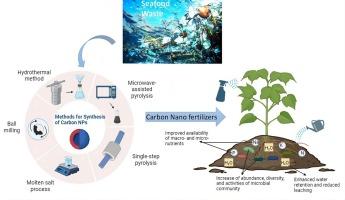Valorization and repurposing of seafood waste to next-generation carbon nanofertilizers
IF 9.7
1区 环境科学与生态学
Q1 AGRICULTURAL ENGINEERING
引用次数: 0
Abstract
The surge in population growth, urbanization, and shifts in food consumption patterns have resulted in a rise in the global production of organic waste. This waste material must be repurposed and effectively managed to minimize environmental footprints. The generation of abundant biowaste, especially from marine sources, may have detrimental impacts on the environment and human health if left untreated. In recent years, substantial efforts have been made to valorize seafood waste, contributing significantly to the sustainability of the blue economy through the repurposing of marine discards. Seafood waste can be transformed into different by-products which can be applied as soil amendment to enhance soil quality and health, demonstrating a holistic approach to repurposing and waste utilization. The extraction of bioactive metabolites from these waste materials has opened avenues for developing nanofertilizers. This intersection of waste valorization and nanotechnology is pertinent in the context of sustainable agriculture. While conventional fertilizers improve soil fertility with significant leaching and gaseous losses, the advent of nanofertilizers introduces a paradigm shift with their targeted and controlled delivery mechanisms, rendering them significantly more efficient in resource utilization and mitigation of environmental crises. This review delves into the global issue of seafood waste accumulation, offering an overview of various methods for repurposing. The primary aim of this review is to bring into limelight the recent efforts in developing a portfolio of carbon-based nanofertilizers derived from organic waste, replacing previous valorization methods due to their sustainability, efficiency, and eco-friendliness. There are immense opportunities for future work in this direction by exploring innovative nanoengineering approach owing to the potential of carbon nanofertilizers in enhancing the production of value-added products and reduction of environmental pollution.

海产品废弃物的价值评估和再利用:下一代碳纳米肥料。
人口激增、城市化和食品消费模式的转变导致全球有机废物的产量增加。必须对这些废料进行再利用和有效管理,以尽量减少对环境的影响。大量生物废物的产生,尤其是来自海洋的生物废物,如果不加以处理,可能会对环境和人类健康产生不利影响。近年来,人们为海产品废弃物的价值化做出了巨大的努力,通过对海洋废弃物的再利用,极大地促进了蓝色经济的可持续性。海产品废弃物可转化为不同的副产品,这些副产品可用作土壤改良剂,以提高土壤质量和健康水平,这展示了一种废物再利用的整体方法。从这些废料中提取生物活性代谢物为开发纳米肥料开辟了道路。在可持续农业的背景下,废物价值化和纳米技术的这种交集具有现实意义。传统肥料在提高土壤肥力的同时也会造成大量的沥滤和气体损失,而纳米肥料的出现则带来了范式的转变,其定向和可控的施肥机制使其在资源利用和缓解环境危机方面的效率大大提高。本综述深入探讨了海产品废物积累这一全球性问题,概述了各种再利用方法。本综述的主要目的是介绍最近在开发从有机废物中提取的碳基纳米肥料组合方面所做的努力,这些碳基纳米肥料因其可持续性、高效性和生态友好性而取代了以往的增值方法。由于碳纳米肥料在提高高附加值产品生产和减少环境污染方面的潜力,未来通过探索创新的纳米工程方法在这一方向开展工作的机会巨大。
本文章由计算机程序翻译,如有差异,请以英文原文为准。
求助全文
约1分钟内获得全文
求助全文
来源期刊

Bioresource Technology
工程技术-能源与燃料
CiteScore
20.80
自引率
19.30%
发文量
2013
审稿时长
12 days
期刊介绍:
Bioresource Technology publishes original articles, review articles, case studies, and short communications covering the fundamentals, applications, and management of bioresource technology. The journal seeks to advance and disseminate knowledge across various areas related to biomass, biological waste treatment, bioenergy, biotransformations, bioresource systems analysis, and associated conversion or production technologies.
Topics include:
• Biofuels: liquid and gaseous biofuels production, modeling and economics
• Bioprocesses and bioproducts: biocatalysis and fermentations
• Biomass and feedstocks utilization: bioconversion of agro-industrial residues
• Environmental protection: biological waste treatment
• Thermochemical conversion of biomass: combustion, pyrolysis, gasification, catalysis.
 求助内容:
求助内容: 应助结果提醒方式:
应助结果提醒方式:


